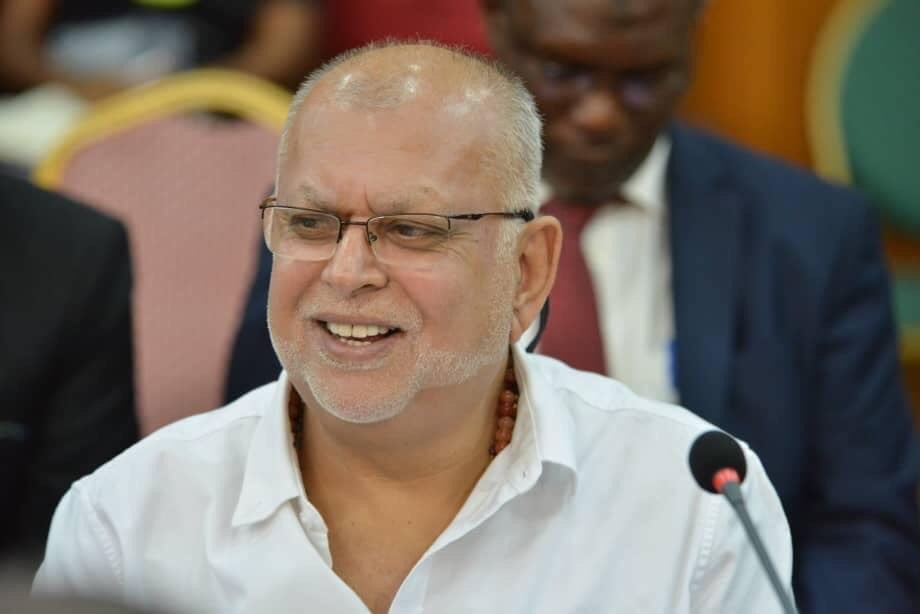By Frank Kamuntu
A London High Court Judge, Mr Stephen Hofmeyr KC of the London High Court⏤ the Business And Property Courts Of England And Wales King’s Bench Division, has dismissed an interim application by dfcu Bank Limited for security for costs brought against Crane Bank Limited. dfcu Bank, together with its shareholder companies as well as directors of those companies and former managers of the bank had sought security for costs in case they won the ongoing £170 million (UGX825.8 billion) court battle brought against them by Crane Bank Limited and its shareholders.

However, the judge ruled that since Dr Sudhir Ruparelia, one of the directors of Crane Bank, who is also party to the case, was willing and able to pay these costs in case of a loss, this was enough security of costs and proceeded to dismiss dfcu Bank’s interim application.
“The two most pertinent factors, which work in tandem, are, first, that the second claimant (Dr Sudhir Ruparelia) is willing to undertake to pay any order the court may make that costs are to be paid by the claimants; and, second, that the second defendant is a “good mark” for those costs, i.e. that if costs order were to be made against the claimants, the second claimant would be able to pay it,” Judge Stephen Hofmeyr KC ruled.
“For the reasons I have given, the security applications are dismissed,” he further ruled, ordering: “I would be grateful if counsel could draw up an appropriate order which will need to include the undertakings by the Second Claimant (Dr Ruparelia) to the Court to discharge any costs orders made against the Claimants and to give a written personal guarantee covering such liabilities”. dfcu Bank Limited and others, in their application, argued that there was reason to believe that Crane Bank “will be unable to pay its costs if ordered to do so”.
However, Crane Bank and its directors argued that any orders on costs, in case of loss, should be made against all the claimants and not just Crane Bank alone, as has been done to date in these proceedings. They also argued that Dr Ruparelia had offered an undertaking to the court to discharge any costs orders made against Crane Bank. To prove Dr Sudhir’s ability to meet those costs, the Crane Bank team put forward evidence that Dr Sudhir, one of the directors and a co-claimant, was one of the richest men in East Africa who, at the time of filing the case had substantial wealth with USD 279 million in assets, “including unencumbered land and buildings of about USD47 million and bank deposits of over USD7 million as well as property in the United Kingdom valued at between £4.5 million and £5.5 million. It was further adduced before the court that since the filing of the case, his wealth and assets had increased substantially by about USD50 million.
£170 million (UGX825.8 billion) battle against dfcu Bank rages on In December 2020 Crane Bank and its shareholders sued dfcu bank, its holding company, dfcu Limited, as well as dfcu Bank’s former board chairman, Jimmy Mugerwa (now dfcu Limited Chairman), Juma Kisaame, the former dfcu Bank CEO. Also sued are dfcu’s majority shareholders at the time⏤CDC Group Plc, as well as Norfinance AS, Rabo Partnerships B.V., and Arise BV, as well as the respective directors of these shareholder companies, namely Stephen Caley, Michael Alan Turner, Albert Jonkergouw, Willem Cramer, Ola Rinnan and Deepak Malik. Shareholders of the former Crane Bank allege that senior former officials at the Bank of Uganda engaged in a corrupt scheme to take control of Crane Bank and sell its assets at a gross undervalue while also syphoning off public funds. Along with its shareholders, Crane Bank also claims that dfcu Bank and the other defendants took part in this fraudulent scheme and purchased Crane Bank’s assets at a gross undervalue while also effectively paying a bribe.
Following a bruising defeat handed down to the Bank of Uganda in Ugandan courts, the billionaire businessman, in 2020 went to London courts against dfcu Bank and its shareholders, who are large DFIs in EuropeHowever, when the case first came up for mention dfcu Bank and its shareholders, separately challenged the jurisdiction of the London High Court on the case, arguing that the seizure and sale of dfcu was a sovereign act of the government of Uganda and therefore the claims before the foreign act of state rule debarred the court. The rule bars English Courts from adjudicating on the lawfulness of executive acts of a foreign state (Uganda), under the laws of that state and performed within its territory. On 19 October 2022, High Court Judge HH Pelling KC gave dfcu Bank a temporary win and ruled that the matter was bound by the foreign act state of rule and, therefore, out of his jurisdiction.
Crane Bank shareholders appealed this ruling and in a unanimous ruling on 26th July 2023, three London appellate court justices⏤ Sir Julian Flaux, Lord Justice Popplewell and Lord Justice Phillips, set aside the High Court ruling and said that while the act of taking over Crane Bank and placing it under receivership by the Central Bank was a sovereign act, “the BoU, in acting as receiver, must be taken to have owed the usual common law and equitable duties to its principal (CBL) to act in good faith and to obtain a proper price for property under receivership”.
“Further, the sale to dfcu Bank, as set out in the Agreement, was a straightforward commercial transaction on standard commercial terms: indeed the parties expressly declared that it was a commercial contract,” the Court of Appeal in London ruled. “I am of the view that it is well arguable, at the very least, that the sale by the BoU as the receiver was commercial activity, regardless of the purpose of the BoU in entering it and giving associated dispensations. It is, therefore, arguable that the foreign act of state doctrine does not bar the claim, and the jurisdiction challenge should, therefore, have been dismissed. I would accordingly allow the appeal on this ground,” Sir Julian Flaux ruled in his lead judgement. Court also ordered dfcu Bank to pay shareholders of the former Crane Bank Limited (CBL), £1,875,000 (UGX8.8 billion) in court costs. Court also ordered that the quintet must refund, within 14 days, with 4.5% interest per annum, the £1,250,000 (UGX5.9 billion), that the CBL shareholders paid to them on 27 October 2022 as costs, when the High Court initially dismissed the main case brought up by CBL’s shareholders.
Dfcu bank and its shareholders then appealed the Court of Appeal ruling in the Supreme Court, which dismissed dfcu & others’ appeal and referred the main case back to the London’s Business And Property Courts Of England And Wales King’s Bench Division for determination. “After consideration of the applications filed on behalf of the Appellants seeking permission to appeal the order made by the Court of Appeal on 26 July 2023 and of the notices of objection filed by the Respondents, the Court ordered that permission to appeal be refused because the applications do not raise an arguable point of law which the court should consider at this time (i.e. before trial),” reads an extract from the 8th January 2024 ruling by Lord Lloyd-Jones, Lord Leggatt and Lord Burrows of the UK Supreme Court. The Supreme Court also ordered that dfcu & others pay costs to Crane Bank, Dr Sudhir and other Crane Bank Directors.
Following the resumption of the case at the Business And Property Courts Of England And Wales King’s Bench Division, dfcu and the co-defendants then went ahead to file the interim application for security of costs against Crane Bank Limited and its shareholders, which application has now been dismissed. The dismissal of the instant interim application clears the ground for the main £170 million (UGX825.8 billion) case to proceed. Dfcu to “vigorously defend itself” In a statement, dfcu Bank said that it “has consistently maintained that the claim is without merit and continues to vigorously defend the claim”. “dfcu has always ascribed to ethical standards of global best practice and will continue to deliver value to its shareholders and best service to its customers. Our subsidiary, dfcu Bank, remains strong and is capitalised well above the Central Bank requirements for commercial banks”, the statement said in part.

